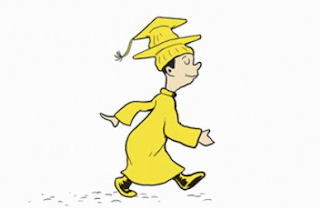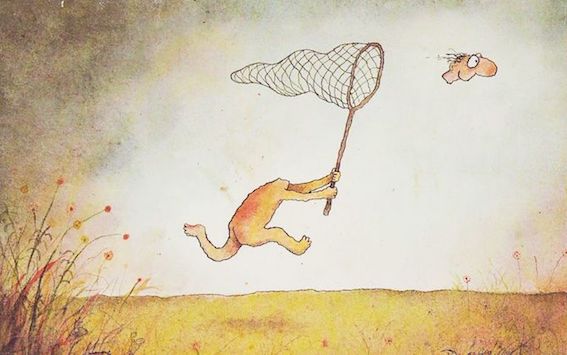Academic dreams
Many of the research students I work with aspire to becoming
academics. However, it’s a difficult time to be dreaming about a career in
academia. At the moment, there are far more PhD graduates than jobs available.
The research environment is increasingly competitive, fast-paced,
high-pressured and output-driven. For those just starting out or who aren’t
leading the race, it’s a space that can, at times, feel unforgiving. Yet every
year ushers in a new cohort of students bright with academic dreams.
I’ve noticed that the goal or expectation of getting an academic position
in today’s job climate directly impacts students’ experiences of, and attitudes
toward, the research process. There are two effects that stand out: a
persistent feeling of pressure associated with an anticipated outcome and/or
deadline, and greater focusing on the thesis and managing distractions or
commitments. In other words, difficulty keeping attention in the present moment.
In my role, I’ve been developing resources to help students stay connected with
their work and themselves despite or within these systemic pressures.
Academic dreams or aspirations describe the relationship between
what we’re doing now and what comes later. I’ve noticed that dreams (goals or
expectations) can work in two ways. They give us with a necessary sense of
direction and purpose and remind us why we’re doing what we’re doing. Dreams
offer us inspiration and encouragement to stick with the task of producing a
thesis – they foster a hopeful attitude. Without a strong motivation driving
the research process, such as career goals or a question that really matters to
us, many would struggle to complete the degree. However, as easily as they
create hope, dreams can also inspire fear. If I’m not at my best or have
experienced a set back, my dreams can quickly turn into a bar set out of reach,
a goal at risk of being unfulfilled. They can become a source of unhelpful
pressure. In other words, what I want
can equally fill me with the confidence that I will succeed or the fear that I
won’t.
For example, as a PhD student I was very
future-oriented. My supervisor told me that to get an academic job I’d need to
build up a CV with publications, teaching, research and conference experience. I
applied myself to these tasks. I loved the teaching, thrived at conferences,
learnt a lot as a research assistant and managed to publish a little. None of
these activities were a waste of time. But like many of the students I see today, I took on too much. I
said ‘yes’ to almost every opportunity, and stretched my time and energy
between too many commitments. My mind felt pulled
by an invisible current toward the things I imagined I 'should' be doing to
make myself employable. This emphasis on the future made it harder to be with my
thesis, especially through the difficult patches. My imagined success became a
psychological obstacle to simply being with the writing in its drafty,
imperfect and vulnerable state. It didn't once occur to me that the most basic
criteria for an academic job is a strong PhD.
There’s nothing wrong with aspiring to an academic career. It’s
important to know what you want and have a sense of where you’re heading. I’m
not suggesting we try to get rid of the experience (an impossible task anyway). But it’s important to see dreams for what they are and be clearly aware of how we
relate to them. Dreams are pleasant, future-oriented projections
of what we want, hope for or expect from our efforts. They are stories we
nurture about the future. There’s a crucial difference between knowing this and
being deeply caught up in or rigidly attached to ideas of success.
In Buddhist philosophy, dreaming is a mental state otherwise known
as sense desire, wanting or grasping. It is the first of the five
hindrances, which are mental factors or states that obstruct our
present moment experience. Sense desire – or simply, desire – refers to wanting
pleasurable experiences. It is the feeling of wanting any experience other than
the one that’s happening right now. For example, if I’m hungry I start thinking
about what I'd like to eat. If I’m bored I automatically reach for an
experience that’s more stimulating - my phone, the TV or fridge. In each case,
I mentally move toward an experience that is more pleasurable than, or that
alleviates the discomfort of, my current experience (hunger, boredom). This
impulse often takes the forms of thinking, fantasising or daydreaming. As a
reaction, it is literally impulsive in the sense of being automatic or habitual.
One of my teachers likens the feeling of sense desire to being caught in a rip and
dragged away from where we are without even realising it.
When we dream, our attention is not in the present moment. It is
lost in thoughts, projections and ideas about the future. In the case of
academic dreams, we’re focused on the end goal or product rather than the
day-to-day, moment-to-moment process of doing the research. Too much focus on
the outcome makes doing the work harder because we cannot occupy these two
places, or senses of time, at once.
To my students, I’d say two things. First, be aware of how you
relate to dreams. How tightly or lightly do you hold them? How often are they a
source of nourishment or a trigger for distraction and doubt? Second, when you
notice yourself getting lost in the future in any form, pay gentle attention to
the experience. If dreaming is happening, observe it. If fear is present, lean
in and be curious about it. What do you feel? What are the characteristics of
these experiences? Just let it be. Then return your attention to the task at
hand. Again and again.




Academic dreams are the hopes and objectives that motivate people to seek education for knowledge, success, and personal development. However, many students considering the best CIPD assignment help to meet writing standards and achieve the top grades in studies.
ReplyDeleteThis blog thoughtfully explores the idea of academic dreams and the challenges students face while pursuing higher education. The discussion connects well with the support many learners seek through University assignment help Dubai, especially when balancing studies and expectations. The content feels relatable, clear, and relevant to student experiences.
ReplyDelete